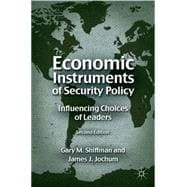
Note: Supplemental materials are not guaranteed with Rental or Used book purchases.
Purchase Benefits
What is included with this book?
Acknowledgments * Forward to the Second Edition * Introduction * PART I: THE INDIVIDUAL * Chapter One: States Don’t Make Decisions; People Do * Adam Smith and Twenty-first Century National Security * Maximizing, Rationality, and the Bounds of Institutions * Experimentation in Economic Science * Chapter Two: The Economics of Autocracies * Some Are Ranchers and Some Are Wolves * Predicting the Dictator: A Theoretical Model * Chapter Three: Principles for Policymakers * PART II: THE WORLD * Chapter Four: Castro’s Cuba and U.S. Sanctions * The Cuban Economy in the 1990s * Dictating Economic Performance * Sanctions: Truth in Advertising * Chapter Five: Democracies and the Politics of Trade * Free Trade Agreements * Case Study: The PRC and Most Favored Nation Status * Case Study: Pistachios, Rugs, and Relationship-Building * Case Study: India and Commerce * Case Study: The PRC, Public Disclosure and Verified End Users * Import Restrictions * Case Study: The PRC and non-market economies * Trade as a Tool: Roundup * Chapter Six: Money and Finance as Security Tools * Money * Inflation * Case Study: Swiss dinars and Saddam dinars * Case Study: Internet Marketplace * Case Study: Money Laundering in Ukraine * Chapter Seven: Exchange Rate Choices and National Security * Choosing an Exchange Rate * Case Study: Dollarization * Choosing Power Over Growth, Again * Chapter Eight: Maximizing Over Time Through Lending and Borrowing * International Finance * Case Study: International Financial Institutions and the East Asian Financial Crisis * Case Study: Tibet vs. the World Bank at Qinghai * Sovereign Lending and Foreign Direct Investment * Debt Dynamics and Debates * Case Study: Debt Forgiveness – Republic of Congo * Case Study: Did the Great Recession Change the Competitive Equation? * Summary: Money, Exchange Regimes, Debt * Chapter Nine: Curing Poverty Helps National Security * Terrorism, Insurgency, and Poverty * Theory of Growth * Incentives and Growth * De-industrialization: When Countries Do Not Invest in Domestic Capacity * Case Study: The Millennium Challenge Account * Case Study: The African Growth and Opportunity Act * Case Study: Saudi Arabian Charities * Case Study: Iraq * Case Study: Syria * Case Study: Law Enforcement Against al Qaeda * Case Study: Brothers to the Rescue and the “Anti-Terrorism Amendment” to the FSIA * Conclusion * Appendix * Endnotes
The New copy of this book will include any supplemental materials advertised. Please check the title of the book to determine if it should include any access cards, study guides, lab manuals, CDs, etc.
The Used, Rental and eBook copies of this book are not guaranteed to include any supplemental materials. Typically, only the book itself is included. This is true even if the title states it includes any access cards, study guides, lab manuals, CDs, etc.